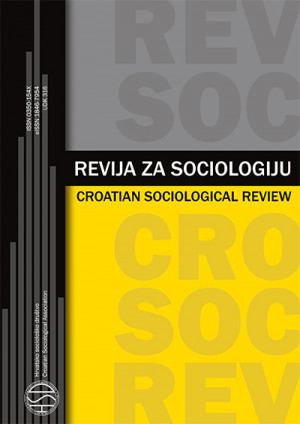Schwartz’s Human Values and the Care for Nature in Croatia and Five Other Central European Countries Based on ESS Data from Round 4 (2008) and Round 9 (2018)
Schwartz’s Human Values and the Care for Nature in Croatia and Five Other Central European Countries Based on ESS Data from Round 4 (2008) and Round 9 (2018)
Author(s): Bruno Šimac, Tijana Trako Poljak, Vladimir IvanovićSubject(s): Environmental interactions, EU-Approach / EU-Accession / EU-Development
Published by: Hrvatsko sociološko društvo
Keywords: Human Values Scale; pro-environmental attitudes; European Social Survey; Croatia; Central Europe;
Summary/Abstract: This paper examines the care for nature in Croatia based on the European Social Survey (ESS) data from Round 4 (2008) and Round 9 (2018) over time and cross-nationally, in comparison with five other Central European (CE) countries (Czech Republic, Hungary, Poland, Slovakia and Slovenia). We correlate the item about the care for nature with Schwartz’s Human Values Scale (HVS), as adapted for the ESS, to investigate whether values as defined by Schwartz serve as good predictors of the care for nature in selected CE countries. We also look at the correlation with respondents’ socio-demographic characteristics. Our analysis reveals that, while there are similarities regarding environmental attitudes and values among CE countries, there are also some individual differences. Croatia shows the strongest increase in the support for the care for nature over the 10-year period, and both Croatia and Slovenia score the highest on the care for nature in 2018. Poland, Slovakia and Czech Republic show an overall stagnation in the results, while Hungary exhibits a significant decrease between 2008 and 2018. Our research in CE countries confirms that Schwartz’s HVS can be predictive of pro-environmentalism. However, while the findings for the higher-order value of Self-transcendence are in line with existing literature, the result suggesting that Conservatism is also a moderately good predictor of the care for nature is somewhat surprising. We posit that the reason could lie in the difference between collectivist vs. individualist value types, which provides a new dimension for the interpretation of environmental attitudes in these countries.
Journal: Revija za sociologiju
- Issue Year: 51/2021
- Issue No: 3
- Page Range: 431-459
- Page Count: 30
- Language: English

